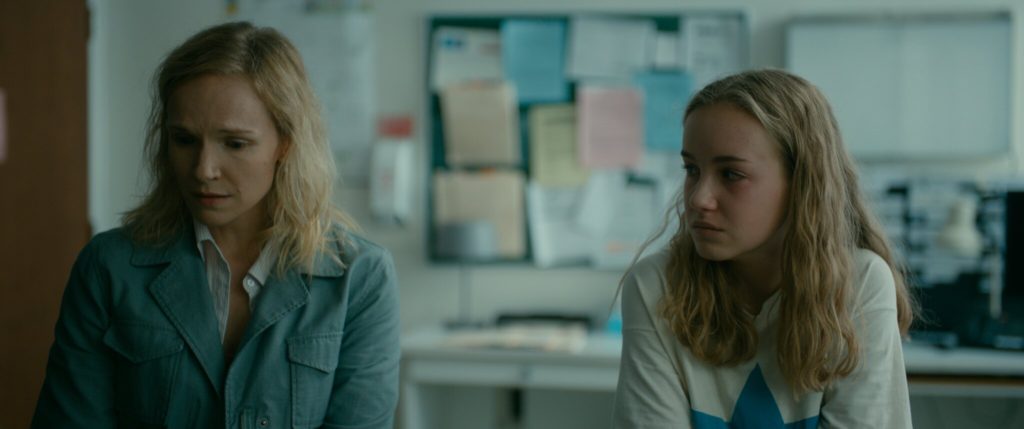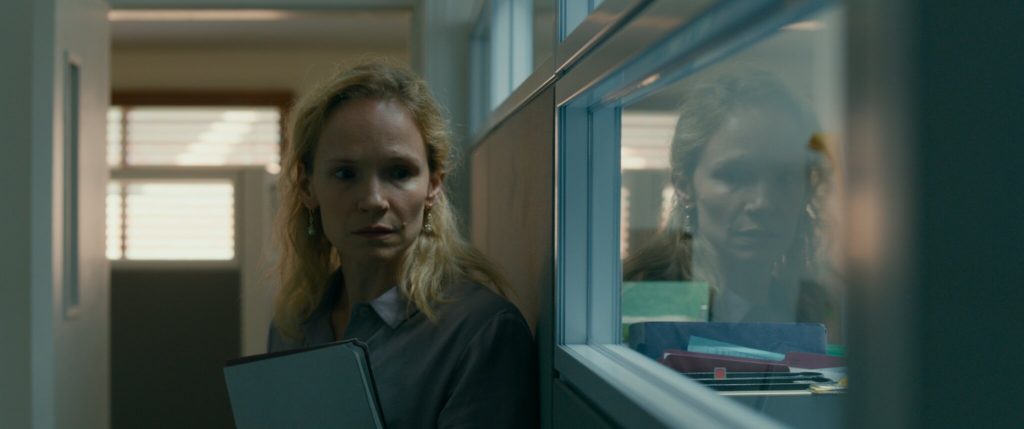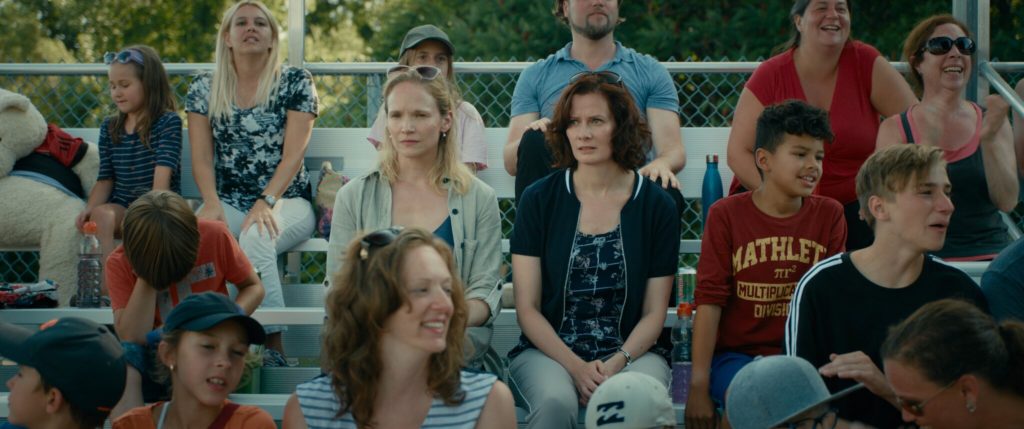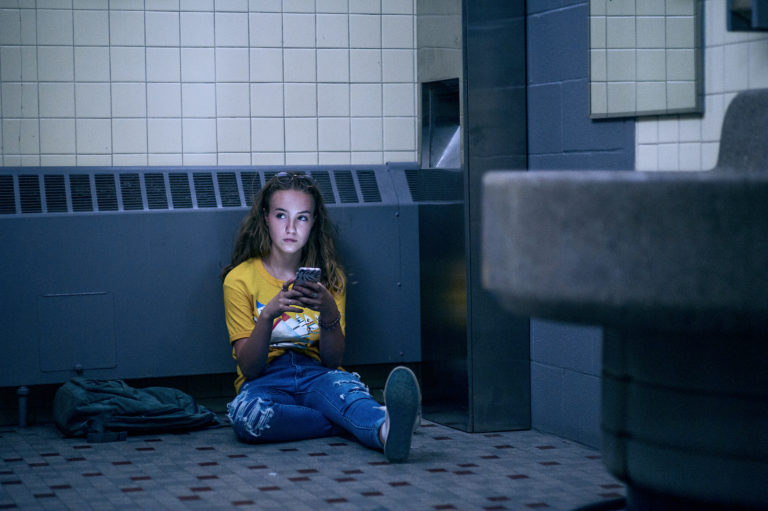Les nôtres (2021 | Canada | 103 minutes | Jeanne Leblanc)
There are a handful of films that you can say, without a doubt, are absolutely brilliant. From the precise presentation of its visuals to the delicate construction of its story, Les nôtres is one of those films. For reasons that will become abundantly clear, it also is an incredibly difficult one to recommend. However, it is one that, no matter how painful, must be experienced.
A drama that functions more as a horror film about the inescapably racist underpinnings of its society, it is set in the small town of Sainte-Adeline, Quebec. It follows the teenage Magalie Jodoin, played with a haunting grace by Émilie Bierre, as her life is upended. It opens on a celebratory party that is soon revealed to be a glitzy fundraiser populated by all the usual faces one would expect. You know the type, the well-to-do, wealthy members of society who have all gathered in the same room to pat each other on the back incessantly. There is a speech by the mayor, people dance, and it all seems like a nice evening.
Hard cut to Magalie alone on a bed, with her exposed back to the camera. A simple cut, from the joys and music of the party to the cold emptiness of the room, immediately sets you on edge. It is unclear what exactly has happened or why she is there, though there is insistent screaming in your head that something is terribly wrong. The film proceeds to jump ahead in time to show the aftermath of that one night with the consequences it will have on Magalie’s life.
Specifically, Magalie is pregnant. She passes out in a dance class at school, injuring her arm, and further inspections reveal she has been pregnant for several months. Her mother Isabelle (Marianne Farley) goes through a whirlwind of shock, confusion, and frustration. Immediately taking on the role of a protective mother, she removes a well-intentioned social worker from the room in order to protect her daughter. Not understanding who the father is or how this could have happened, she initially acts as a stand-in for the audience though only for a moment.

That is because the film puts Magalie and her experiences at the forefront of the film, rightly placing her very much at the center of her own story. In a lesser film, the “adults” of the community would be the ones who have to track down whoever is responsible for the pregnancy and solve the “mystery.” Only here, there is a more interesting story being told. There is no mystery and it soon is clear there are no genuine adults in the community, only pretenders going through the motions of doing what they naively think can provide some degree of protection. The real threat is an internal one they both don’t ever see coming and, when they begin to learn more, do not want to accept. They soon embrace the oblivion of denial rather than confront their own complicity.
We soon learn Magalie was the victim of a statutory rape by an adult man of the town who was seen in the beginning of the film. He has groomed Magalie into getting into bed with him and has now impregnated a teenage girl, though not everyone knows this at first. Revealing this information is not a spoiler as the film is not about superficial surprises or reveals. Most of this information becomes clear to the audience early on in the film. Instead, it is about the stomach churning violence and abuse that takes place behind closed doors in the homes of polite white society. It is that central focus on race and power, initially kept to a low hum, that soon becomes an inescapable cacophony. It is upsetting and deeply unnerving, though also remarkably unflinching in its delivery that draws you deeper into the film with every twist of the knife.
The first instance of the underlying, ever-present racism comes from Magalie’s own mother. In an early scene, desperate for answers, she subjects Magalie to relentless interrogation about who the father is. Growing frustrated, she snaps and says it must be “that little Mexican” who got her pregnant. The accused young boy is named Manu (Léon Diconca Pelletier) and is a quiet, kind foster child under the “care” of none other than the mayor of the town, Jean-Marc Ricard (Paul Doucet). The fact that Magalie’s mother, who up until this point seemed to be a focal point of kindness, transitions so quickly into racist speculations seems initially unexpected. However, it is that transition from politeness to hatred when threatened that is precisely the point.

The film is a comprehensive examination of what happens when the mask worn by an otherwise outwardly polite society slips. It happens gradually, with an off-handed comment by Magalie’s mother serving only as the beginning of the descent into hate. The town collectively begins to go from one of tepid benevolence toward horrifyingly insular collusion. The result is a world where Magalie must not just fend for herself, but find some way to peace when there are no adults she can look to for support. It is a coming of age realization that the world is a cruel place and Magalie must decide whether she wishes to take part in the cruelty.
Writer and director Jeanne Leblanc captures this struggle with a compassion for Magalie’s pain while also being willing to show how nightmarish the world around her is. She faces unrelenting abuse from her classmates over the fact that she is pregnant and for who they wrongly believe to be the father. What begins as snide, underhanded comments morphs into persistent slut shaming that never shows any sign of letting up. It is meticulous and captured with a patient eye, letting scenes continue on far beyond the point of discomfort into near existential dread. The breaking point comes in a simple yet terrifying scene in a car outside Magalie’s school, marking an inflection point where she must decide what future she wishes to have.
The closest comparison would be to the outstanding 2020 film The Assistant, which also centered around one person’s recognition of the cruelty festering underneath the fabric of a supposedly kind environment. The narrative mechanics are different, The Assistant took place largely within a single building, though the authentic impression left by both films are not. It is impossible to shake the feeling that both films are showing you something widely prevalent but meant to be left unspoken. To see these realities exposed to the world is uncomfortable, agonizing even, though ultimately revelatory in what most cinema can only hope to be.

Leblanc brings outstanding technical direction that is no less revelatory. The framing and composition of every shot is outstanding, with rich detail flowing through every moment. When Magalie’s mother confides to a friend about what has happened, Leblanc lingers on the scene where both women must process the information while keeping up appearances that nothing is wrong. It is the combination of brilliant performances and outstanding direction that makes this moment remain eternally relevant.
The scene serves as a powerful visual thesis statement showing ultimately how they both would rather live in a sense of “normalcy” even if it means overlooking the horror close to home. When paired with a gorgeously unsettling score by composer Marie-Hélène L. Delorme, whose work doesn’t have a wrong note throughout the whole film, it rips your entire sense of hope for the world off its axis. As it should, the film shows a rotting sickness that is at the core of the community.
Only it isn’t just that community, it is about whether our own community would rather protect itself through racist scapegoating than look inwardly at its own profoundly rotten core. For a film to show so honestly how one person, one child, has to reckon with that rottenness makes for the most impactful type of storytelling.
Les nôtres (Our Own) is available to watch virtually at The Grand Illusion Cinema and in theaters now.



